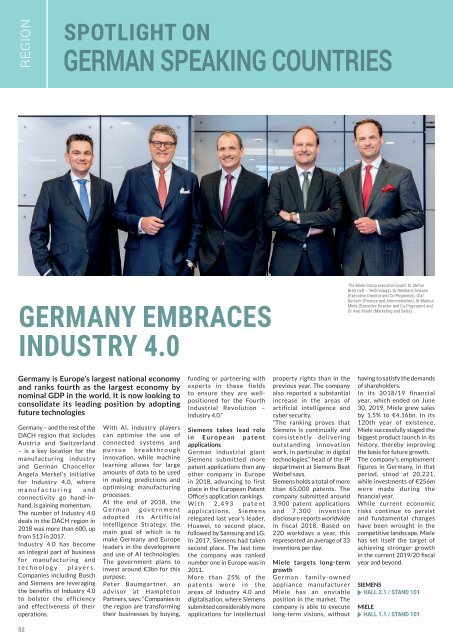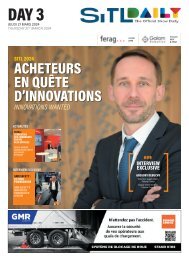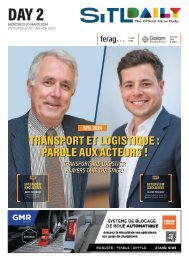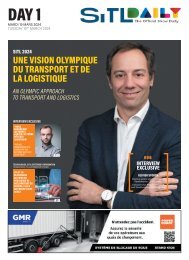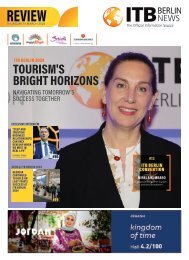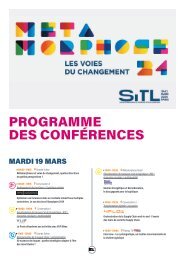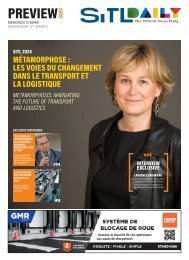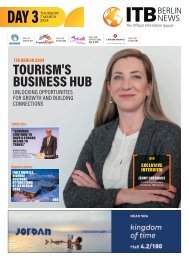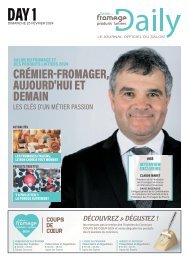IFA International 2019 Week-End Edition
You also want an ePaper? Increase the reach of your titles
YUMPU automatically turns print PDFs into web optimized ePapers that Google loves.
REGION<br />
SPOTLIGHT ON<br />
GERMAN SPEAKING COUNTRIES<br />
GERMANY EMBRACES<br />
INDUSTRY 4.0<br />
The Miele Group executive board: Dr Stefan<br />
Breit (left – Technology), Dr Reinhard Zinkann<br />
(Executive Director and Co-Proprietor), Olaf<br />
Bartsch (Finance and Administration), Dr Markus<br />
Miele (Executive Director and Co-Proprietor) and<br />
Dr Axel Kniehl (Marketing and Sales)<br />
Germany is Europe’s largest national economy<br />
and ranks fourth as the largest economy by<br />
nominal GDP in the world. It is now looking to<br />
consolidate its leading position by adopting<br />
future technologies<br />
Germany – and the rest of the<br />
DACH region that includes<br />
Austria and Switzerland<br />
– is a key location for the<br />
manufacturing industry<br />
and German Chancellor<br />
Angela Merkel’s initiative<br />
for Industry 4.0, where<br />
manufacturing and<br />
connectivity go hand-inhand,<br />
is gaining momentum.<br />
The number of Industry 4.0<br />
deals in the DACH region in<br />
2018 was more than 600, up<br />
from 513 in 2017.<br />
Industry 4.0 has become<br />
an integral part of business<br />
for manufacturing and<br />
technology players.<br />
Companies including Bosch<br />
and Siemens are leveraging<br />
the benefits of Industry 4.0<br />
to bolster the efficiency<br />
and effectiveness of their<br />
operations.<br />
With AI, industry players<br />
can optimise the use of<br />
connected systems and<br />
pursue breakthrough<br />
innovation, while machine<br />
learning allows for large<br />
amounts of data to be used<br />
in making predictions and<br />
optimising manufacturing<br />
processes.<br />
At the end of 2018, the<br />
German government<br />
adopted its Artificial<br />
Intelligence Strategy, the<br />
main goal of which is to<br />
make Germany and Europe<br />
leaders in the development<br />
and use of AI technologies.<br />
The government plans to<br />
invest around €3bn for this<br />
purpose.<br />
Peter Baumgartner, an<br />
advisor at Hampleton<br />
Partners, says: “Companies in<br />
the region are transforming<br />
their businesses by buying,<br />
funding or partnering with<br />
experts in these fields<br />
to ensure they are wellpositioned<br />
for the Fourth<br />
Industrial Revolution –<br />
Industry 4.0.”<br />
Siemens takes lead role<br />
in European patent<br />
applications<br />
German industrial giant<br />
Siemens submitted more<br />
patent applications than any<br />
other company in Europe<br />
in 2018, advancing to first<br />
place in the European Patent<br />
Office’s application rankings.<br />
With 2,493 patent<br />
applications, Siemens<br />
relegated last year’s leader,<br />
Huawei, to second place,<br />
followed by Samsung and LG.<br />
In 2017, Siemens had taken<br />
second place. The last time<br />
the company was ranked<br />
number one in Europe was in<br />
2011.<br />
More than 25% of the<br />
patents were in the<br />
areas of Industry 4.0 and<br />
digitalisation, where Siemens<br />
submitted considerably more<br />
applications for intellectual<br />
property rights than in the<br />
previous year. The company<br />
also reported a substantial<br />
increase in the areas of<br />
artificial intelligence and<br />
cyber security.<br />
“The ranking proves that<br />
Siemens is continually and<br />
consistently delivering<br />
outstanding innovation<br />
work, in particular, in digital<br />
technologies,” head of the IP<br />
department at Siemens Beat<br />
Weibel says.<br />
Siemens holds a total of more<br />
than 65,000 patents. The<br />
company submitted around<br />
3,900 patent applications<br />
and 7,300 invention<br />
disclosure reports worldwide<br />
in fiscal 2018. Based on<br />
220 workdays a year, this<br />
represented an average of 33<br />
inventions per day.<br />
Miele targets long-term<br />
growth<br />
German family-owned<br />
appliance manufacturer<br />
Miele has an enviable<br />
position in the market. The<br />
company is able to execute<br />
long-term visions, without<br />
having to satisfy the demands<br />
of shareholders.<br />
In its 2018/19 financial<br />
year, which ended on June<br />
30, <strong>2019</strong>, Miele grew sales<br />
by 1.5% to €4.16bn. In its<br />
120th year of existence,<br />
Miele successfully staged the<br />
biggest product launch in its<br />
history, thereby improving<br />
the basis for future growth.<br />
The company’s employment<br />
figures in Germany, in that<br />
period, stood at 20,221,<br />
while investments of €256m<br />
were made during the<br />
financial year.<br />
While current economic<br />
risks continue to persist<br />
and fundamental changes<br />
have been wrought in the<br />
competitive landscape, Miele<br />
has set itself the target of<br />
achieving stronger growth<br />
in the current <strong>2019</strong>/20 fiscal<br />
year and beyond.<br />
SIEMENS<br />
HALL 2.1 / STAND 101<br />
MIELE<br />
HALL 1.1 / STAND 101<br />
52


